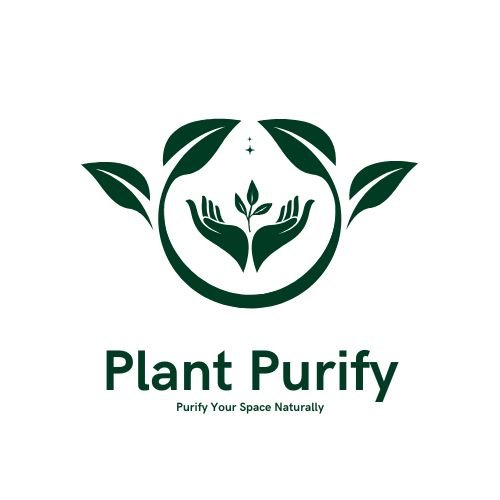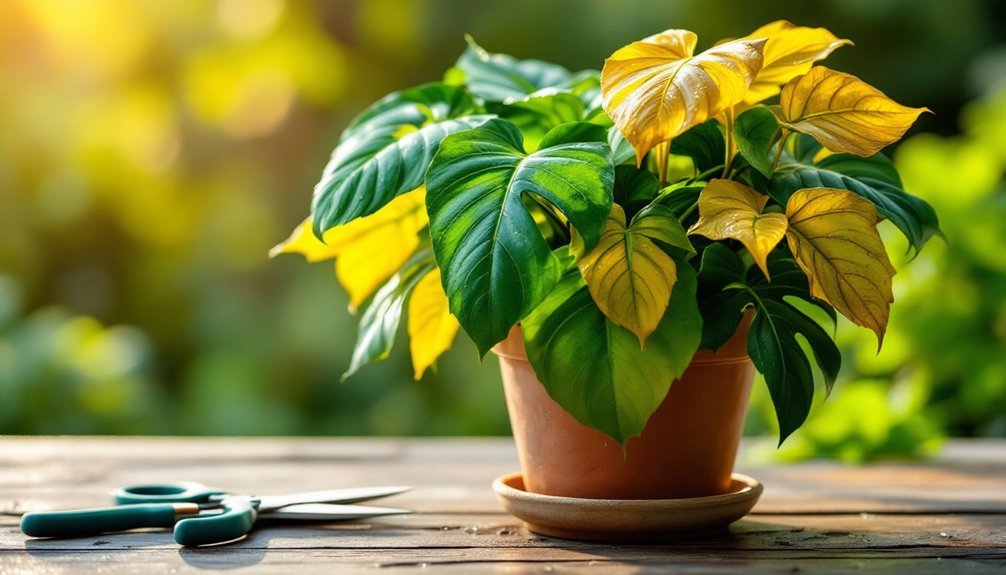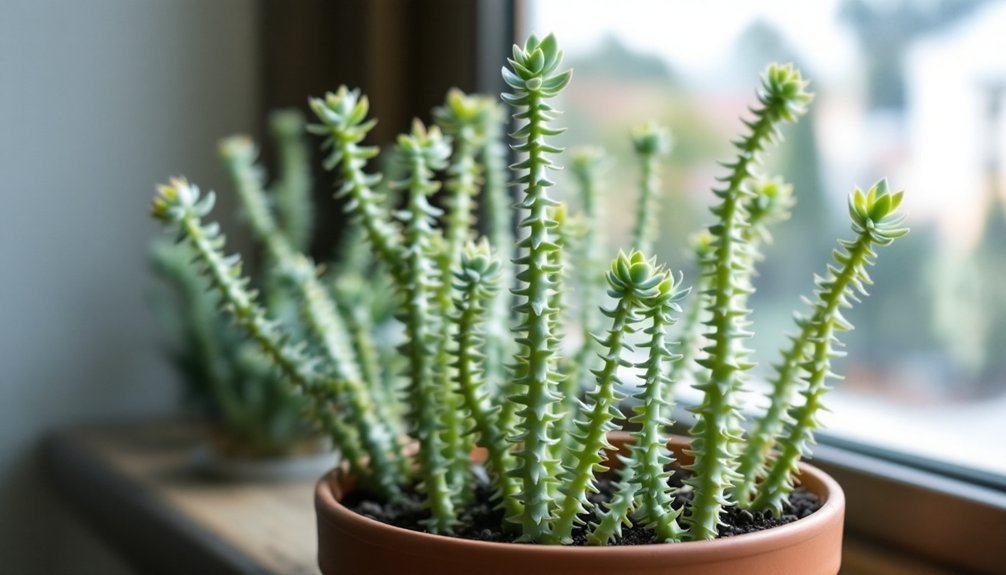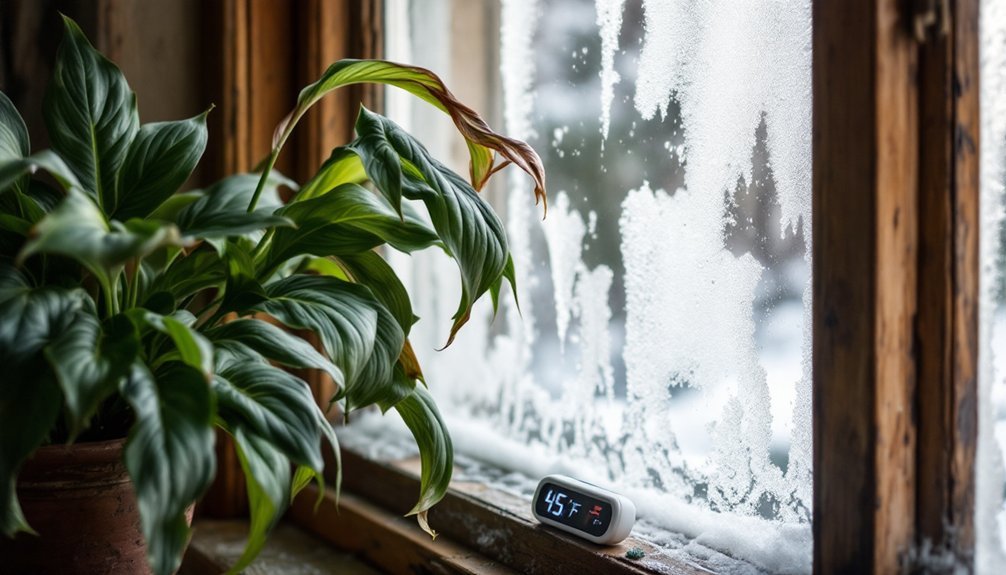Transform your home's air quality this summer with these powerful natural purifiers. You'll benefit from Snake Plants' overnight oxygen production, Spider Plants' humidity control, and Peace Lilies' toxin-removing abilities. Boston Ferns, Bamboo Palms, Aloe Vera, and Rubber Plants round out your indoor clean-air arsenal, each targeting specific pollutants while adding tropical beauty. Discover how these seven green champions can revolutionize your indoor environment with minimal maintenance and maximum impact.
Powerful Air-Filtering Snake Plants for Summer Months

While many homeowners turn to electronic air purifiers during summer, snake plants offer a natural and decorative solution for cleaner indoor air. These hardy plants excel at filtering out harmful toxins like formaldehyde from your living spaces, making them exceptional air-purifying allies during the warmer months.
You'll appreciate that snake plants continue working even while you sleep, converting CO2 into oxygen throughout the night. That's why they're perfect for your bedroom.
Growing up to 4 feet tall, they're not just air quality champions – they're striking decorative elements too. During summer months, you won't need to fuss over their care since they're incredibly low-maintenance.
They'll thrive in low light and don't require frequent watering, making them an effortless way to improve indoor air quality year-round.
Spider Plants: Natural Summer Humidity Controllers
Although electronic dehumidifiers are popular, spider plants offer a natural and elegant solution for managing summer humidity levels in your home. These versatile humidity controllers require minimal care while effectively absorbing excess moisture and filtering pollutants like formaldehyde and xylene from your indoor air.
| Benefits | Care Requirements | Environment Impact |
|---|---|---|
| Controls Humidity | Well-drained Soil | Enhances Air Quality |
| Filters Toxins | Indirect Sunlight | Creates Comfort |
| Low Maintenance | Regular Watering | Balances Moisture |
You'll find these plants particularly effective during summer months when maintaining ideal indoor air conditions becomes essential. By placing spider plants throughout your home, you're creating a more comfortable living environment while naturally purifying the air. Their ability to thrive with basic care makes them an perfect choice for anyone seeking to enhance air quality without complex maintenance routines.
Peace Lily's Peak Performance in Warm Weather

As temperatures rise during summer months, Peace Lilies reach their ideal growing conditions, making them exceptional air purifiers for your home.
You'll find these plants thrive in warm weather between 65°F to 85°F, perfectly suited for summer indoors. Their remarkable air-purifying qualities effectively remove indoor pollutants like formaldehyde, benzene, and carbon monoxide.
To maximize your Peace Lily's performance, place it in well-lit areas with indirect sunlight to prevent leaf scorching.
You'll need to maintain consistent watering during summer, keeping the soil moist but not waterlogged.
As an added bonus, these efficient air cleaners reward your care with stunning white blooms that last for weeks, enhancing your home's aesthetic appeal.
With proper placement and care, your Peace Lily will perform at its peak while beautifying your space.
Boston Ferns: Summer's Natural Air Refreshers
Your Boston fern's air-purifying power depends heavily on smart placement, so position it near east-facing windows or in bright corners where it'll receive indirect sunlight while maintaining essential humidity levels.
Keep your fern's soil consistently moist and mist it regularly during summer months to maximize its natural air-cleaning abilities and promote healthy growth.
For best results, feed your fern with a balanced, water-soluble fertilizer every 4-6 weeks throughout the growing season, ensuring it has the nutrients needed to reach its full air-purifying potential.
Fern Placement For Success
When searching for natural air purifiers, Boston ferns stand out as powerful allies in creating a healthier home environment.
These effective indoor air purifiers remove formaldehyde and other harmful compounds while adding a touch of natural beauty to your space.
To enhance your fern's air-purifying capabilities, consider these strategic placement tips:
- Position your fern in bathrooms or kitchens where moisture levels naturally support their growth.
- Choose spots with indirect sunlight and good air circulation to prevent mold growth.
- Place the pot on a humidity tray filled with pebbles to maintain ideal moisture.
- Set up your fern away from drafts or air vents that could dry out the leaves.
Remember to maintain well-draining soil and regularly mist the leaves to guarantee your natural air refresher thrives year-round.
Humidity And Light Requirements
Since Boston ferns excel at purifying indoor air, maintaining proper humidity and lighting conditions becomes crucial for their performance.
You'll need to keep humidity levels between 60-80% to maximize their air-refreshing capabilities. To achieve this, try misting your ferns regularly or setting up a pebble tray filled with water beneath them.
As natural air purifiers, Boston ferns thrive best in indirect light.
Place them where they'll receive bright, filtered sunlight to maintain their lush foliage while effectively removing indoor air pollutants like formaldehyde and xylene.
With proper care, these ferns can grow up to 3 feet, making a substantial impact on your indoor spaces' air quality.
The combination of ideal humidity and lighting conditions guarantees your Boston ferns will continue functioning as efficient air purifiers throughout the summer months.
Essential Care And Feeding
Three key elements form the foundation of Boston fern care during summer: proper watering, well-draining soil, and regular fertilization.
To maximize their ability to remove indoor air pollutants, you'll need to maintain ideal growing conditions for lush growth.
Follow these essential care steps:
- Keep the soil consistently moist but not waterlogged, using well-draining soil to prevent root rot.
- Maintain high humidity levels through regular misting, especially during dry summer days.
- Place your fern in bright, indirect sunlight to prevent leaf burn while encouraging healthy growth.
- Feed with diluted liquid fertilizer every 4-6 weeks during summer's active growing season.
Bamboo Palm: Tropical Air-Cleaning Champion
Your Bamboo Palm acts like a high-performance air filtration system, naturally removing harmful toxins while boosting indoor humidity levels during dry summer months.
You'll appreciate its versatility as it flourishes in bright, indirect light yet adapts well to lower-light conditions, making it perfect for various spots in your home.
This tropical champion requires minimal care while delivering maximum benefits, efficiently clearing your indoor air of formaldehyde, benzene, and other harmful pollutants.
Natural Humidity Control Benefits
While many air purifiers rely on mechanical systems to control humidity, the Bamboo Palm offers a natural solution that's both effective and aesthetically pleasing.
You'll notice the difference in your home's air quality as this tropical plant works to maintain ideal moisture levels while removing indoor pollutants.
Here's how the Bamboo Palm naturally improves your indoor environment:
- Creates a natural humidity balance by releasing moisture into the air, helping you breathe easier during dry summer months.
- Removes harmful toxins like formaldehyde, benzene, and trichloroethylene through its air-purifying properties.
- Supports better respiratory health by maintaining consistent humidity levels and cleaner air.
- Requires minimal care while delivering maximum benefits, making it a low-maintenance choice for year-round air quality improvement.
Low-Light Growth Success
Despite its tropical origins, the Bamboo Palm thrives remarkably well in low-light indoor environments, making it a standout choice for spaces with minimal natural sunlight. You'll appreciate how this versatile plant adapts to shaded areas while maintaining its powerful air-purifying qualities.
As your Bamboo Palm grows up to 7 feet tall, it'll actively remove harmful toxins like formaldehyde, benzene, and trichloroethylene from your indoor air. The plant's natural ability to increase humidity levels supports your respiratory health, especially in dry summer conditions.
To maximize its aesthetic appeal and air-cleaning benefits, keep the soil consistently moist without overwatering. You don't need to worry about finding the perfect sunny spot – this tropical champion will flourish in those challenging low-light corners while continuously improving your home's air quality.
Air-Toxin Removal Capabilities
The Bamboo Palm's exceptional air-purifying abilities make it a natural powerhouse in the fight against indoor toxins. When you place this tropical champion in your indoor settings, you'll benefit from its remarkable air purification capabilities, especially during summer months.
Your Bamboo Palm actively works to improve air quality by:
- Removing up to 80% of airborne pollutants within just 24 hours
- Eliminating harmful substances like formaldehyde, benzene, and trichloroethylene
- Increasing humidity levels naturally, counteracting dry air from air conditioning
- Cleaning the air continuously when properly maintained
To maximize your plant's toxin removal efficiency, guarantee regular maintenance through proper watering and light exposure.
You'll find that this low-light tolerant plant excels at creating a healthier indoor environment while adding a touch of tropical beauty to your space.
Aloe Vera's Dual Benefits in Summer Heat
Summer heat brings unique challenges for maintaining clean indoor air, but adding Aloe Vera plants to your home offers a powerful two-fold solution.
You'll benefit from its natural air purifying qualities while maintaining ideal humidity levels during hot summer months.
This remarkable succulent works alongside your mechanical air purifiers to remove harmful toxins like formaldehyde and benzene from your indoor air.
What's even better is that Aloe Vera releases oxygen at night, making it perfect for your bedroom.
You'll notice improved respiratory health and fewer allergy symptoms, especially during peak pollen season.
Don't worry about complex maintenance – Aloe Vera thrives in warm temperatures and bright, indirect sunlight.
Rubber Plant's Enhanced Summer Filtration Power

When indoor air quality becomes a top concern during warmer months, Rubber Plants emerge as powerhouse purifiers for your home. Your Ficus elastica not only adds aesthetic value but also effectively filters indoor air pollutants, especially those pesky volatile organic compounds that tend to accumulate during summer months.
Here's what makes the Rubber Plant your ideal summer air-cleaning companion:
- Reaches impressive heights of 8 feet indoors, maximizing filtration capabilities
- Thrives in bright, indirect sunlight while requiring low-maintenance care
- Absorbs formaldehyde and other harmful toxins through its large, glossy leaves
- Reduces allergens considerably, making your indoor environment more comfortable
You'll appreciate this plant's ability to combat air pollution while requiring only moderate watering and occasional pruning to maintain its air-purifying effectiveness.
Frequently Asked Questions
Do Air Purifiers Help in Summer?
Yes, air purifiers help you greatly during summer by removing allergens, pollen, and outdoor odors. They'll improve your indoor air quality, reduce respiratory issues, and keep your home's environment fresher when it's hot outside.
What Is the Most Highly Recommended Air Purifier?
You'll find the Blueair Blue Pure 211+ is consistently ranked as the top choice. It's highly recommended for its powerful three-layer filtration, Energy-Star efficiency, and excellent performance in capturing allergens and pollutants.
What Is the Best Air Filtration System for Grow Room?
You'll want a multi-stage system combining HEPA and activated carbon filters, like the Rabbit Air A3. It'll effectively remove particles and odors while maintaining ideal humidity levels for your grow room setup.
Do Indoor Air Purifiers Actually Work?
Yes, you'll find indoor air purifiers work effectively, removing 99.97% of airborne particles from your home. They'll reduce allergens, dust, and pollutants, providing noticeable improvements in air quality and breathing comfort.
In Summary
You'll breathe easier this summer by cultivating these natural air purifiers in your home. Place them strategically in rooms where you spend the most time, and don't forget to maintain them with proper watering and occasional dusting of their leaves. Whether you choose the resilient snake plant or the tropical bamboo palm, you're investing in cleaner air and a healthier living space during the warmest months.





Leave a Reply